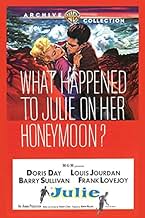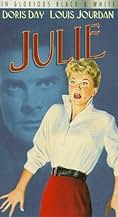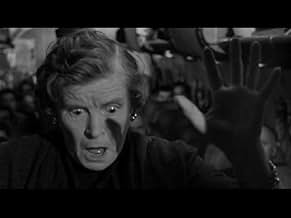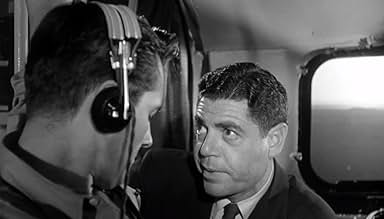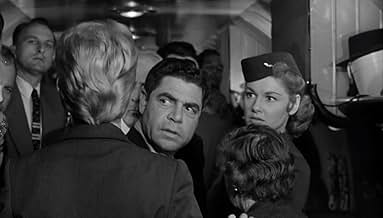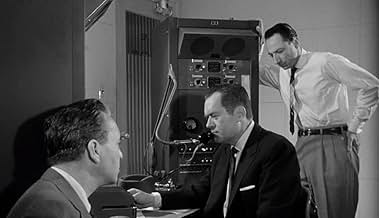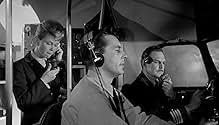IMDb रेटिंग
6.2/10
2.3 हज़ार
आपकी रेटिंग
अपनी भाषा में प्लॉट जोड़ेंA terrified wife tries to escape from her insanely jealous husband who is bent on killing her.A terrified wife tries to escape from her insanely jealous husband who is bent on killing her.A terrified wife tries to escape from her insanely jealous husband who is bent on killing her.
- 2 ऑस्कर के लिए नामांकित
- 2 कुल नामांकन
Pamela Duncan
- Peggy Davis
- (बिना क्रेडिट के)
फ़ीचर्ड समीक्षाएं
Most comedy movies could only hope to be this amusing. An airy, drippy title song plays, setting up the audience for some sort of romantic drama. No such luck. Immediately (and hilariously at odds with the opening music), Day comes running on, desperately trying to avoid her husband (Jourdon), who has apparently made a scene over her attention to another man. She hops in her car and he joins her. Even though the road is almost perfectly straight, Day spins the hell out of her steering wheel, furiously wielding it back and forth on a straight road! This overwrought and overheated beginning is merely a prelude for the wildly illogical and melodramatic story that follows. Jourdon turns out to be a crazed, obsessive danger to Day and the film involves her repeated attempts to get away from him before he kills her. Ms. Day is a delightful screen presence and is certainly capable, in the right hands, of delivering a terrific dramatic performance (i.e.--Hitchcock's "The Man Who Knew Too Much".) Here, however, she is up against a heinous script (astonishingly nominated for an Oscar!) and contrived, silly situations which make her look foolish. Worst of all is her (hysterically funny) series of dramatic voice-overs. The production feels the need to have her breathlessly describe all her feelings and state what is clearly happening on screen! The wording is often fall down funny and her despairing delivery paired with the stark visuals pair up to create several moments of screaming laughter. One scene has her "desperately" trying to get away from Jourdon, but she still manages to pack her favorite outfits and even seemingly make sure she selects the right purse to go with her shoes. Another has her running from him in a snug skirt until she falls on a big rock and lays there. The whole movie is filmed with a crisp, clinical detachment since this was a bold new subject and all the happenings were so bleak and gripping. This makes for some really dry viewing today, especially when the (inept) police do their thing and during the climax when realistic (but uninteresting) air traffic controllers communicate with Day. Day, a stewardess, gets a breather midway through to scramble some eggs and sashay around in a kicky one piece lounge suit (and act as if nothing is wrong with her life!) In this section, the demure, twice-married character even refuses to come out and meet a gentleman her makeshift roomie is dating because she's not dressed (even though her full-length nightgown comes down to her knuckles and almost reaches her ears! Yes... women just didn't DO that, but it's still amusing!) Stay tuned for the really kooky climax in which she and one other stewardess work a flight in which Day doesn't even realize that Jourdon in ON board! (Like a person wouldn't immediately pick out someone who they know is out to kill them!) Situations eventually warrant that Day has to fly and land the plane herself (Karen Black fans will be disappointed to learn that she wasn't the first woman in this predicament. Cross-eyed Black did it in "Airport 1975", but Day beat her by 19 years....and she flies a significant portion of the trip with her eyes CLOSED!! Notably, with regards to sexism, little had changed in those two decades, for the men call Day "honey" the whole time while in Black's case, they continuously called her "honey" and "baby"...) So many other ripe moments have been left out, but in any case, the film is a scream. Jourdon is indeed surprisingly menacing and Day tries very hard (and found the filming very difficult in real life.) Also fun is a glimpse at how dressy and glamorous airports used to be and how much air travel has changed. Don't miss the amateur actress playing an apartment resident who, when asked about Day's character, pronounces "Julie" as "Julah".
"Julie" starts out as a mass of tension, (other than the ridiculous rear-projection car scenes where everyone turns the steering wheel in wrong directions!) packing an intense amount of story in the first 40 minutes. By the second act, when the pace slows down, all the previous scenes seem too condensed for comfort. One scene in the beginning of the film is especially intriguing: Lyle practices his piano piece while Julie lays on the couch. Watching his hands dance over the keys, and the beautifully framed shot of him against the open window is truly surreal, almost too profound for a film of this type.
The third act, all about Doris Day landing the airplane, feels like an entirely separate movie. With the loss of the human threat after her, it stops being a thriller and becomes the tag ending of an action blockbuster. "Julie" has uneven bursts of calm and nail-biting tension, all in all a strange combination with its own memorable moments.
The third act, all about Doris Day landing the airplane, feels like an entirely separate movie. With the loss of the human threat after her, it stops being a thriller and becomes the tag ending of an action blockbuster. "Julie" has uneven bursts of calm and nail-biting tension, all in all a strange combination with its own memorable moments.
The writer-director (and producer of many other films, although not this one) Andrew L. Stone was only nominated once for an Academy Award for Best Screenplay, and he was very proud of this one. I worked for Stone in the mid-1970's, and he looked back at "JULIE" as a piece of his finest work.
The maniacal husband-as-stalker was a new kind of character for films in 1956. The honest discussion of how law enforcement often failed 'women in jeopardy' brought up issues which only became widely discussed in the 1970's.
Doris Day plays the role of a terrorized wife trying to escape from the husband who is trying to kill her, and this is such a well-done treatment of the subject that even jaded audiences today respond to it.
The climactic scene in which Doris Day lands the passenger plane with help from the control tower is riveting, because it is based on fact. Andrew L. Stone was an exhaustive researcher, and you can be sure every detail of that scene was checked and re-checked. It would have happened in real life just as you see it on the screen.
Stone kept a collection of 'true crime' magazines dating from the 1930's in his office library, and he had dozens of plot ideas for thrillers like this one. However, he had always been his own boss and not a 'studio man'. Hollywood didn't give him big budgets, and he never had the opportunity to continue his career as Hitchcock did. Mentally sharp through his 80's, Stone spent the last decade of his life trying to put deals together to make movies that never got off the ground. Our loss.
The maniacal husband-as-stalker was a new kind of character for films in 1956. The honest discussion of how law enforcement often failed 'women in jeopardy' brought up issues which only became widely discussed in the 1970's.
Doris Day plays the role of a terrorized wife trying to escape from the husband who is trying to kill her, and this is such a well-done treatment of the subject that even jaded audiences today respond to it.
The climactic scene in which Doris Day lands the passenger plane with help from the control tower is riveting, because it is based on fact. Andrew L. Stone was an exhaustive researcher, and you can be sure every detail of that scene was checked and re-checked. It would have happened in real life just as you see it on the screen.
Stone kept a collection of 'true crime' magazines dating from the 1930's in his office library, and he had dozens of plot ideas for thrillers like this one. However, he had always been his own boss and not a 'studio man'. Hollywood didn't give him big budgets, and he never had the opportunity to continue his career as Hitchcock did. Mentally sharp through his 80's, Stone spent the last decade of his life trying to put deals together to make movies that never got off the ground. Our loss.
JULIE! Doris Day runs for her life in this drama about a woman with a psychopathic husband (Louis Jourdan). The story seems to start in the middle - it begins with Jourdan trying to crash his car with Julie in it because he's jealous of her talking to someone. We learn that Jourdan, who plays a concert pianist, is Julie's second husband, her first having committed suicide. Except that apparently he didn't according to a mutual friend, Cliff (Barry Sullivan). Cliff is worried about Julie living with this nut job and thinks that hubby #2 may have gotten rid of hubby #1. Determined to find out, Julie confronts him, and he admits it. Thus begins her desperate attempt to get away from him. When she finally escapes, she goes back to her old job as flight attendant on an airline.
The story hit a little too close to home for Doris Day, who didn't want to make the film because it reminded her of two earlier marriages. And possibly her third, as Marty Melcher insisted that she do it and was unhappy when she appeared friendly with Jourdan. However, thanks to the film, she discovered Carmel and Monterey and eventually made her home there. The scenery is glorious.
Day does the narration which uses the phrase "strangely disturbing" several times. It's maybe not the best movie you've ever seen but it is very entertaining, and Doris is great as the terrified woman. What a talent, and her '60s reinvention made her bigger than ever. Jourdan is quietly terrifying, and there are many suspenseful moments in the film. Highly watchable - it's a little all over the place, starting off as one thing and ending as another - but it will really hold your interest.
The story hit a little too close to home for Doris Day, who didn't want to make the film because it reminded her of two earlier marriages. And possibly her third, as Marty Melcher insisted that she do it and was unhappy when she appeared friendly with Jourdan. However, thanks to the film, she discovered Carmel and Monterey and eventually made her home there. The scenery is glorious.
Day does the narration which uses the phrase "strangely disturbing" several times. It's maybe not the best movie you've ever seen but it is very entertaining, and Doris is great as the terrified woman. What a talent, and her '60s reinvention made her bigger than ever. Jourdan is quietly terrifying, and there are many suspenseful moments in the film. Highly watchable - it's a little all over the place, starting off as one thing and ending as another - but it will really hold your interest.
Having just finished "The Man Who Knew Too Much" for Alfred Hitchcock,
Doris Day repeats the genre and does a wonderful job in a suspence drama. The story flowed well, and Miss Day's performance was outstanding. ( She even smokes !! ) Too bad She never got to do a second film with The Master of Suspence. That is the only thing that could have improved this movie. It has a lot of the feel of Suspision, and the edgeness of Midnight Lace. Both fine films of Hitchcock and Day respectivly. Highly recommended for a good rainy afternoon.
Doris Day repeats the genre and does a wonderful job in a suspence drama. The story flowed well, and Miss Day's performance was outstanding. ( She even smokes !! ) Too bad She never got to do a second film with The Master of Suspence. That is the only thing that could have improved this movie. It has a lot of the feel of Suspision, and the edgeness of Midnight Lace. Both fine films of Hitchcock and Day respectivly. Highly recommended for a good rainy afternoon.
क्या आपको पता है
- ट्रिवियाDoris Day has written that her close friendship with co-star Louis Jourdan angered her jealous producer husband Martin Melcher, mirroring the character relationships in the film.
- गूफ़In the opening scene, Julie is constantly turning the steering wheel, even when the rear projection shows the car to be moving in a straight line.
- भाव
Julie Benton: Sergeant, I want to report a murder!
- कनेक्शनEdited into The Green Fog (2017)
- साउंडट्रैकMidnight On The Cliff
Composed and Performed by Leonard Pennario
Orchestrated by Lucien Cailliet (uncredited)
टॉप पसंद
रेटिंग देने के लिए साइन-इन करें और वैयक्तिकृत सुझावों के लिए वॉचलिस्ट करें
- How long is Julie?Alexa द्वारा संचालित
विवरण
बॉक्स ऑफ़िस
- बजट
- $7,85,000(अनुमानित)
- चलने की अवधि1 घंटा 39 मिनट
- रंग
इस पेज में योगदान दें
किसी बदलाव का सुझाव दें या अनुपलब्ध कॉन्टेंट जोड़ें



